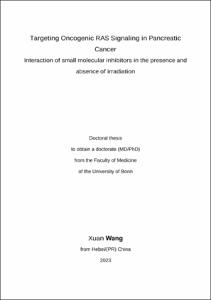Wang, Xuan: Targeting Oncogenic RAS Signaling in Pancreatic Cancer : Interaction of small molecular inhibitors in the presence and absence of irradiation. - Bonn, 2023. - Dissertation, Rheinische Friedrich-Wilhelms-Universität Bonn.
Online-Ausgabe in bonndoc: https://nbn-resolving.org/urn:nbn:de:hbz:5-70729
Online-Ausgabe in bonndoc: https://nbn-resolving.org/urn:nbn:de:hbz:5-70729
@phdthesis{handle:20.500.11811/10823,
urn: https://nbn-resolving.org/urn:nbn:de:hbz:5-70729,
author = {{Xuan Wang}},
title = {Targeting Oncogenic RAS Signaling in Pancreatic Cancer : Interaction of small molecular inhibitors in the presence and absence of irradiation},
school = {Rheinische Friedrich-Wilhelms-Universität Bonn},
year = 2023,
month = may,
note = {Pancreatic ductal adenocarcinomas account for 80−90% of all pancreatic malignancies and are among the most lethal of cancers known to date. They are driven by oncogenic KRAS mutations in over 90% of cases, which have been linked to early metastasis and overall poor prognosis and which confer relative resistance to classical cytostatic chemotherapy as well as other forms of systemic therapeutic approaches. The spectrum of oncogenic KRAS variants observed in pancreatic cancers differ significantly from those observed in non-small cell lung, colorectal or other forms of cancer. Pathological KRAS mutations have long been deemed to be "undruggable". Only recently first examples of specific KRAS inhibitors entered the clinical arena, but therapeutic efficacy found in pancreatic cancer is limited and usually not long lasting. In this current work presented here, combinatorial regimens of KRAS and MEK inhibitors are evaluated under the addition of radiotherapy. Pancreatic cancer cell lines with oncogenic KRAS G12C, G12D or wild type KRAS were treated with specific KRAS or SOS1/2 Inhibitors and therapeutic synergisms with concomitant MEK inhibition and irradiation were systematically evaluated by means of MTS, colony formation-, migration-, soft agar-, and apoptosis assays. Underlying pathophysiological mechanisms were examined by using Western blot analyses, ATP- formation-, RealTime-GloTM and Ral A activation assays. KRAS inhibition with the small molecule inhibitor sotorasib showed therapeutic synergism with the MEK inhibitor binimetinib in KRAS G12C-driven pancreatic cancer cells. This observation was also made with two additional substances that were evaluated as "pan KRAS" inhibitors, BI-3406 and BI-2852. Moreover, markedly enhanced sensitivity of therapeutic irradiation was documented upon combined inhibition of KRAS and MEK. These observations represent a therapeutic approach for pancreatic cancer that should further evaluated using in vivo model systems in the future.},
url = {https://hdl.handle.net/20.500.11811/10823}
}
urn: https://nbn-resolving.org/urn:nbn:de:hbz:5-70729,
author = {{Xuan Wang}},
title = {Targeting Oncogenic RAS Signaling in Pancreatic Cancer : Interaction of small molecular inhibitors in the presence and absence of irradiation},
school = {Rheinische Friedrich-Wilhelms-Universität Bonn},
year = 2023,
month = may,
note = {Pancreatic ductal adenocarcinomas account for 80−90% of all pancreatic malignancies and are among the most lethal of cancers known to date. They are driven by oncogenic KRAS mutations in over 90% of cases, which have been linked to early metastasis and overall poor prognosis and which confer relative resistance to classical cytostatic chemotherapy as well as other forms of systemic therapeutic approaches. The spectrum of oncogenic KRAS variants observed in pancreatic cancers differ significantly from those observed in non-small cell lung, colorectal or other forms of cancer. Pathological KRAS mutations have long been deemed to be "undruggable". Only recently first examples of specific KRAS inhibitors entered the clinical arena, but therapeutic efficacy found in pancreatic cancer is limited and usually not long lasting. In this current work presented here, combinatorial regimens of KRAS and MEK inhibitors are evaluated under the addition of radiotherapy. Pancreatic cancer cell lines with oncogenic KRAS G12C, G12D or wild type KRAS were treated with specific KRAS or SOS1/2 Inhibitors and therapeutic synergisms with concomitant MEK inhibition and irradiation were systematically evaluated by means of MTS, colony formation-, migration-, soft agar-, and apoptosis assays. Underlying pathophysiological mechanisms were examined by using Western blot analyses, ATP- formation-, RealTime-GloTM and Ral A activation assays. KRAS inhibition with the small molecule inhibitor sotorasib showed therapeutic synergism with the MEK inhibitor binimetinib in KRAS G12C-driven pancreatic cancer cells. This observation was also made with two additional substances that were evaluated as "pan KRAS" inhibitors, BI-3406 and BI-2852. Moreover, markedly enhanced sensitivity of therapeutic irradiation was documented upon combined inhibition of KRAS and MEK. These observations represent a therapeutic approach for pancreatic cancer that should further evaluated using in vivo model systems in the future.},
url = {https://hdl.handle.net/20.500.11811/10823}
}






